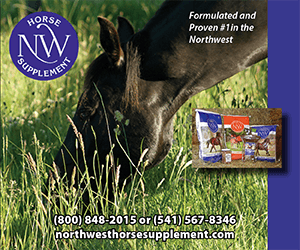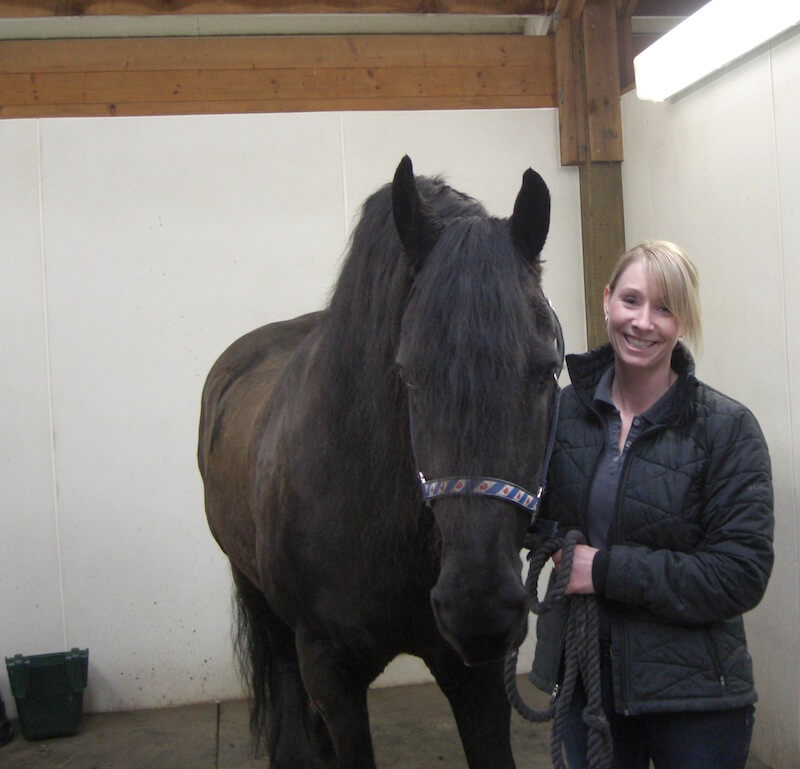Equine Hypersensitivities and Autoimmune Disease
by Stephanie Meyer, DVM, CVA
Hypersensitivity is a state of altered reactivity of the body’s immune system to an allergen (e.g., biting insects, pollen, grass, molds, insects, dust, drugs). After repeat exposure, the immune system mounts an overzealous attack on the invading allergen, resulting in significant inflammation and tissue destruction. There are four types of hypersensitivities, classified by the type of immune process that occurs, resulting in tissue injury. The term allergy refers to Type 1 hypersensitivity diseases only. Type 1 hypersensitivity tissue injury is mediated by IgE antibodies against an allergen.
Equine Type 1 hypersensitivities are often seasonal in nature and manifest as allergies. Many hypersensitivity diseases affect our equine companions; however, the two most common equine allergies I see in the Northwest are insect hypersensitivity and inflammatory airway disease. Although hypersensitivity reactions can contribute to the development of autoimmune diseases, hypersensitivity diseases should not be confused with true autoimmune diseases. Autoimmune disease occurs when an animal’s immune system becomes overactive, confused and uncontrolled, attacking and destroying the animal’s own healthy cells. With a few exceptions, the causative factors that lead to autoimmune diseases in horses are poorly understood. A number of equine diseases are considered to be truly autoimmune in origin. These include, but not limited to: neonatal isoerythrolysis (NI) – occurs when maternal antibodies (via the mare’s colostrum) destroy the foal’s red blood cells; immune-mediated hemolytic anemia (IMHA) and alloimmune thrombocytopenia (AT) – occur when antibodies within the immune system target the horse’s own red blood cells (IMHA) or platelets (AT), causing life-threatening anemia (IMHA) or bleeding disorders (AT); emphigus foliaceus – an autoimmune disease of the skin (similar to psoriasis in humans); and systemic lupus erythematosus – a rare, multi-systemic autoimmune disease that can affect the skin, joints and internal organs.
Therapeutic and Management Options
As veterinarians, therapy focuses on restoring normal immune response, reducing inflammation and subduing the overactive immune system. However, environmental management and prevention strategies should also be considered in the global treatment regimen. Corticosteroids are powerful immunosuppressors and are often a necessary component for treatment of equine allergies. Note that administration of immunosuppressive agents is not without risk. When we suppress a horse’s immune system, the horse may become predisposed to opportunistic infections and other undesirable systemic side effects.
Hyposensitization refers to therapy aimed at lessening the immune system’s response to an allergen, thus reducing the severity of the hypersensitivity disease. This form of treatment can be difficult and requires accurate identification of the allergen causing the hypersensitivity using intradermal skin testing.
There are many preventative options, including decreasing your horse’s exposure to the offending allergen. For example, environmental management strategies are encouraged for horses with inflammatory airway disease (e.g., removing the horse from the barn when stalls are cleaned and soaking its hay to reduce the amount of dust and particles the horse is exposed to when eating). Horses affected with insect hypersensitivity (e.g., Culicoides) should be blanketed, kept stabled during peak insect activity time, topically treated with fly repellants, and bathed frequently to sooth inflamed skin.
Nutritional supplements are becoming increasingly utilized to aid in managing the hypersensitive horse. For example, CoQ10, a cellular enzyme, helps relieve allergies in humans; fatty acids (DHA/EPA only) may be beneficial for atopic dermatitis (e.g., insect hypersensitivity); vitamin C and bioflavonoids have also been recommended for atopic dermatitis. Additionally, integrative medicine modalities may be considered in the management of equine allergies. Acupuncture and systemically and/or topically administered Chinese herbs may help alleviate the clinical signs of allergies and improve the overall function of the immune system. Integrative medicine treatment modalities, just like Western medicine, are tailored to each individual horse and its specific disease process and clinical signs.
The above therapeutic and management options are not intended to be an exhaustive list. All therapy and environmental considerations should be fully discussed with your veterinarian and a therapeutic plan tailored to the needs of your horse and its specific allergy.
 Stephanie Meyer, DVM, CVA, is a certified veterinary acupuncturist and equine practitioner at Pilchuck Veterinary Hospital. She received her veterinary degree in 2006 from Texas A&M University. She then completed a one-year rotating internship in large-animal medicine and surgery at PVH in 2007. She formally joined the PVH staff in 2011 after completing a three-year residency in large-animal internal medicine at the University of Florida. Her special interests are in equine cardiology, neonatal emergency and critical care, and complementary medicine modalities. For more information or to schedule an appointment with Dr. Meyer visit www.pilchuckvet.com.
Stephanie Meyer, DVM, CVA, is a certified veterinary acupuncturist and equine practitioner at Pilchuck Veterinary Hospital. She received her veterinary degree in 2006 from Texas A&M University. She then completed a one-year rotating internship in large-animal medicine and surgery at PVH in 2007. She formally joined the PVH staff in 2011 after completing a three-year residency in large-animal internal medicine at the University of Florida. Her special interests are in equine cardiology, neonatal emergency and critical care, and complementary medicine modalities. For more information or to schedule an appointment with Dr. Meyer visit www.pilchuckvet.com.
Published June 2012 Issue

The Northwest Horse Source is an independently owned and operated print and online magazine for horse owners and enthusiasts of all breeds and disciplines in the Pacific Northwest. Our contemporary editorial columns are predominantly written by experts in the region, covering the care, training, keeping and enjoyment of horses, with an eye to the specific concerns in our region.






